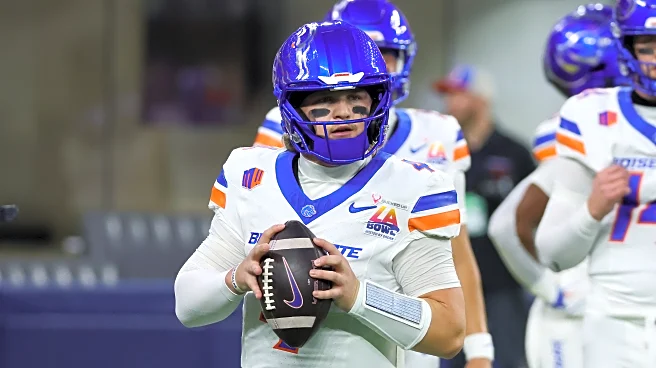Rapid Read • 8 min read
Researchers using the James Webb Space Telescope have proposed a groundbreaking hypothesis that the universe might be situated within a massive black hole. This theory emerged from observations of galactic rotations, where approximately 60% of ancient galaxies were found to rotate clockwise, challenging previous assumptions of randomness. The study, conducted by Kansas State University, suggests that the universe's position within a black hole's gravitational influence could explain this uniformity in galactic rotations. This hypothesis challenges existing cosmological models and introduces the possibility of a universe governed by the laws inherent to a black hole's environment. The implications of this discovery could reshape our understanding of cosmic principles, such as the distribution of matter and the flow of time, potentially operating differently within this cosmic structure.
AD
The potential discovery that our universe might be trapped within a black hole has profound implications for cosmology. It challenges existing theories about the universe's origins, structure, and ultimate fate, necessitating a reevaluation of fundamental cosmic principles. If true, this hypothesis would require the development of new models to describe the universe's behavior within this unique context. The findings underscore the importance of continued exploration and observation of the cosmos, as refining tools like the James Webb Space Telescope could lead to revolutionary insights into the universe's mysteries. This pursuit of understanding drives the scientific community to push the boundaries of knowledge and question the very fabric of reality.
Researchers are considering alternative explanations for the observed galactic rotations, such as the influence of observational bias, specifically the Doppler effect. This effect could alter the perceived motion of galaxies, suggesting the need for recalibration of the James Webb Space Telescope to account for such biases. Addressing these biases is crucial for ensuring the accuracy of future studies and validating the groundbreaking claims made by the current research. As scientists delve deeper into these revelations, the implications could reshape our comprehension of the universe's origin and its ultimate destiny.
The hypothesis that the universe might reside within a black hole opens up new avenues for understanding the universe's true nature and its ultimate fate. It suggests that fundamental cosmic principles might operate differently within this cosmic structure, challenging long-held beliefs about galactic rotations and cosmic dynamics. This realization forces a reevaluation of how we perceive the universe's boundaries and the nature of space-time, potentially leading to a deeper understanding of the forces governing our universe.
AD
More Stories You Might Enjoy












